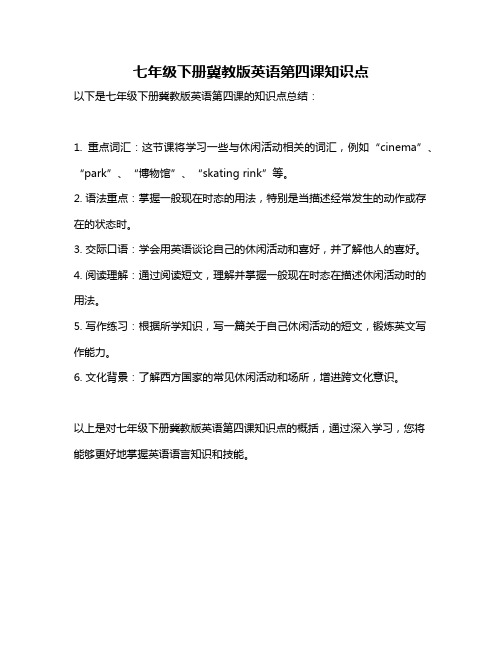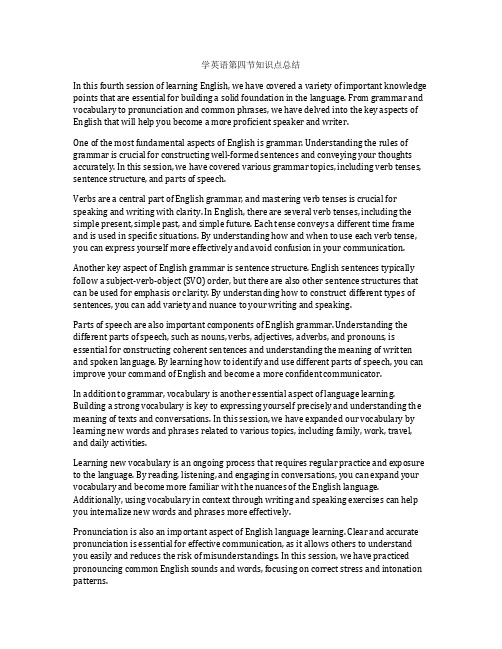第四节课英语学习笔记.
初中英语课堂笔记八年级下册 Unit 4

初中英语课堂笔记八年级下册Unit 4重点短语a big deal重要的事after-school classes课外活动课all the time一直allow sb. to do sth. 允许某人做某事be angry with sb. 生某人的气be oneself做自己call sb. up打电话给某人compete with sb. 与某人竞争copy one's homework抄袭某人的作业cut out删除family membersfight a lot经常吵架/打架get better grades取得更好的成绩get enough sleep有足够的睡眠get into a fight with sb与某人吵架/打架give one's opinion提出某人的观点give sb. pressure给某人施压hang out with sb. 与某人闲逛hang over笼罩have a fight with sb. 与某人吵架have free time有空闲时间in future 今后in the future 在未来learn exam skills学习应试技巧look through翻看make sb. angry使某人生气mind sb. doing sth. 介意某人做某事offer to do sth. 主动提出做某事refuse to do sth. 拒绝做某事so that以便so... that... 如此……以至于……spend time alone独自消磨时光study too much学得过多talk to sb. 与某人交谈too many rules 太多规则too much homework 太多作业work out成功地发展;解决worry about sth. 担心某事write to sb. =write sb. a letter 给某人写信词法精选1.borrow my things without returning them借我的东西不归还witho ut 是with的反义词,意为“没有”,后接名词、代词或动名词。
初中英语|人教版七年级下册Unit4英语课堂笔记

初中英语|⼈教版七年级下册Unit4英语课堂笔记⼈教版七年级下册Unit4英语课堂笔记⼀、重点短语arrive late for class上课迟到after breakfast早饭后after that 在那之后be quiet in the library在图书馆保持安静be strict with sb in sth 在某⽅⾯对某⼈严格bring music players to school把⾳乐播放器带到学校来do the dishes清洗餐具eat outside在外⾯吃feel/be terrible感到/是很糟糕的fight with sb 和某⼈打架follow the rules遵守规则go to bed before 10:00 10点之前睡觉have more rules有更多规则have to clean the classroom必须打扫教室展开全⽂have to wear a school uniform必须穿校服have too many rules有太多规章制度help his mom make breakfast帮他妈妈做早饭in the dining hall在餐厅in the music room在⾳乐室keep my hair short留短发know how you feel知道你的感受learn to play the piano学会弹钢琴make one's bed铺床make rules制定规章制度on school days 在上学⽇on school nights在上学晚上practice (playing) the guitar练习(弹)吉他read books/read a book读书run in the hallways在⾛廊上跑some of the rules其中⼀些规章制度⼆、重点句型1.—What are the rules at your school?在你们学校有什么规章制度?—We can't arrive late for class./We must be on time for class.我们上课不能迟到。
牛津译林版英语七上:Unit4课堂笔记

初中英语学习材料madeofjingetieji一.课文重点Comic strip1.It’s lunchtime. 是吃午饭的时间了.= It’s time for lunch. = It’s time to have lunch.2.Let’s have a h amburger. 让我们吃一个汉包堡.概括: Let’s do sth 让我们做某事(Let’s后用动原)3.be always hungry总是饿(always等频度副词放在情动\Be动\助动之后,行为动词之前)4.need a lot of energy 需要许多能量否定: don’t need a lot of energy (此处的need 为行为动词)5. walk to my bowl many times a day 每天往我的碗走好多次画线提问用how often (多长时间一次),类似的还有:once a week (一周一次),twice a week (一周两次), three times a month (一月三次)6. a healthy person 一个健康的人区别:healthy 健康的(形) e.g. be healthy / keep healthy 保持健康a healthy diet 一个健康的日常饮食health 健康(名 ) e.g. be good for your health 对你的健康有好/益处be bad for your health 对你的健康有害Welcome to the unit1.What is your favourite food?你最喜爱的事物是什么?= What food do you like best? (favourite = like … best )2.What about …. ? …怎么样?What about doing sth ? 做某事怎么样? (about是介词,后跟动词要加ing)3.like sth / dislike sth /love/ hate sth 喜欢/不喜欢/爱/恨某物Like doing / dislike doing sth /love doing sth /hate doing sth喜欢/不喜欢/爱/恨做某事Reading1.want to be a dancer 想成为一名舞蹈家want to be …想成为…2. I dance for two hours every day.对划线提问用How long (多长时间)3.need lots of energy to dance 需要许多能量去跳舞概括: need sth to do …需用某物去做…扩展: need sb to do sth 需用某人做某事need to do sth 需用做某事4.get tired变得疲劳,变累5. I t’s very easy for me to get tired.对我来说很容易变累。
七年级下册冀教版英语第四课知识点

七年级下册冀教版英语第四课知识点
以下是七年级下册冀教版英语第四课的知识点总结:
1. 重点词汇:这节课将学习一些与休闲活动相关的词汇,例如“cinema”、“park”、“博物馆”、“skating rink”等。
2. 语法重点:掌握一般现在时态的用法,特别是当描述经常发生的动作或存在的状态时。
3. 交际口语:学会用英语谈论自己的休闲活动和喜好,并了解他人的喜好。
4. 阅读理解:通过阅读短文,理解并掌握一般现在时态在描述休闲活动时的用法。
5. 写作练习:根据所学知识,写一篇关于自己休闲活动的短文,锻炼英文写作能力。
6. 文化背景:了解西方国家的常见休闲活动和场所,增进跨文化意识。
以上是对七年级下册冀教版英语第四课知识点的概括,通过深入学习,您将能够更好地掌握英语语言知识和技能。
北师大版八年级英语下册 Unit 4 笔记

三、知识梳理
1. I find it hard to control my bad moods. 我感觉很难控制自己的坏情绪。 find it + 形容词+ to do “发觉做...是...”如: I find it difficult to get along with him. 我感觉和他相处挺难的。 2. I try but I can't seem to cheer myself up. 我努力了,但是似乎无法让自己提起精神。 cheer up 恢复活力,使提起精神。如: Cheer up! 打起精神! 3. Most people are shy from time to time, so you're not alone. 大多数人偶尔也会害羞,所以你不 是一个特例。
一、重点短语
13、encourage sb. to do sth. 鼓励某人做某事 14、generation gap 代沟 15、argue about 争论 16、be strict with 对...要求严格 17、complain about 抱怨 18、make sb. do 迫使某人做某事 19、have difficulty (in) doing 做某事有困难 20、advise sb. to do 建议某人做某事 21、offer to do 主动提出做某事 22、fail to do 做某事失败 23、attract one's attention 吸引某人注意 24、(be) in a mess 处于乱的状态 25、get on/along well with sb. 和某人相处得好
三、知识梳理
8. You should attract his attention to some other interests. 你应该把他的注意力吸引到其他兴趣爱好上。 attract one's attention 吸引某人的注意力。如: Action film can attract children's attention. 动作片对小孩子很有吸引力。 9. We have to draw a line somewhere. 我们得加以限制。 draw a line 意为“加以限制,划一界限” 10. But he's a bit lazy so I have to be strict with him. 但是他有些懒,所以我不得不对他严格要求。 be strict with sb. 对某人要求严格。如: First of all, you should be strict with yourself. 首先,你应该严格要求自己。
七年级下册英语第四课笔记

七年级下册英语第四课笔记
English: In the fourth lesson of the seventh grade English textbook, we learned about daily routines and schedules. We learned how to talk about our daily activities using different tenses and adverbs of frequency. We also practiced asking and answering questions about each other's daily routines. In addition, we learned new vocabulary related to daily activities such as "cook dinner," "do homework," and "watch TV." The lesson also included a section on using prepositions of time to talk about when we do certain activities.
中文翻译: 在七年级英语课本的第四课中,我们学习了关于日常生活和日程安排的内容。
我们学会了如何使用不同的时态和频度副词来谈论我们的日常活动。
我们还练习了如何询问和回答关于彼此日常生活习惯的问题。
此外,我们学习了与日常活动相关的新词汇,比如“做晚饭”,“做作业”和“看电视”。
课程还包括了关于如何使用时间介词来描述我们进行特定活动的时间。
三年级上册英语人教pe p版课堂笔记

三年级上册英语人教PEP版课堂笔记第一节(Unit 1 Hello)1. 词汇学习在本单元中,我们学习了一些基本的问候用语,如Hello、Hi和Goodbye等。
在学习过程中,老师通过图片和动作等形式向我们介绍了这些词汇,帮助我们更容易地理解和记忆。
2. 句型练习我们也学习了一些基本的问候句型,如What's your name? My name is…等。
老师在课堂上进行了多次反复操练,让我们熟练掌握了这些句型。
3. 听力训练在听力训练环节,老师播放了一些问候用语的录音,要求我们听懂并做出相应的反应。
通过这种方式,我们不仅提高了听力水平,也学会了正确使用问候用语。
第二节(Unit 2 My School)1. 词汇学习在本单元中,我们学习了与学校相关的一些词汇,如school、classroom、teacher和student等。
老师通过图片和实物向我们展示了这些词汇,帮助我们更加直观地理解它们的意义。
2. 句型练习我们还学习了一些有关学校的句型,如This is my classroom. That is a teacher.等。
老师通过角色扮演和小组讨论等形式,让我们灵活运用这些句型。
3. 语音训练在本节课中,老师特别强调了一些发音细节,如th、s和sh等。
通过课堂上的朗读练习,我们逐渐提高了英语的语音表达能力。
第三节(Unit 3 My Family)1. 词汇学习在本单元中,我们学习了一些与家庭相关的词汇,如father、mother、brother和sister等。
老师通过家庭图片和故事向我们展示了这些词汇的用法,并激发了我们对家庭的情感。
2. 句型练习我们也学习了一些有关家庭的句型,如This is my father. That is my mother.等。
老师通过情景模拟和问答练习,让我们积极参与,熟练掌握了这些句型。
3. 语法训练在本节课中,老师帮助我们学习了一些基本的语法知识,如人称代词的用法和名词的单复数变化规则等。
学英语第四节知识点总结

学英语第四节知识点总结In this fourth session of learning English, we have covered a variety of important knowledge points that are essential for building a solid foundation in the language. From grammar and vocabulary to pronunciation and common phrases, we have delved into the key aspects of English that will help you become a more proficient speaker and writer.One of the most fundamental aspects of English is grammar. Understanding the rules of grammar is crucial for constructing well-formed sentences and conveying your thoughts accurately. In this session, we have covered various grammar topics, including verb tenses, sentence structure, and parts of speech.Verbs are a central part of English grammar, and mastering verb tenses is crucial for speaking and writing with clarity. In English, there are several verb tenses, including the simple present, simple past, and simple future. Each tense conveys a different time frame and is used in specific situations. By understanding how and when to use each verb tense, you can express yourself more effectively and avoid confusion in your communication. Another key aspect of English grammar is sentence structure. English sentences typically follow a subject-verb-object (SVO) order, but there are also other sentence structures that can be used for emphasis or clarity. By understanding how to construct different types of sentences, you can add variety and nuance to your writing and speaking.Parts of speech are also important components of English grammar. Understanding the different parts of speech, such as nouns, verbs, adjectives, adverbs, and pronouns, is essential for constructing coherent sentences and understanding the meaning of written and spoken language. By learning how to identify and use different parts of speech, you can improve your command of English and become a more confident communicator.In addition to grammar, vocabulary is another essential aspect of language learning. Building a strong vocabulary is key to expressing yourself precisely and understanding the meaning of texts and conversations. In this session, we have expanded our vocabulary by learning new words and phrases related to various topics, including family, work, travel, and daily activities.Learning new vocabulary is an ongoing process that requires regular practice and exposure to the language. By reading, listening, and engaging in conversations, you can expand your vocabulary and become more familiar with the nuances of the English language. Additionally, using vocabulary in context through writing and speaking exercises can help you internalize new words and phrases more effectively.Pronunciation is also an important aspect of English language learning. Clear and accurate pronunciation is essential for effective communication, as it allows others to understand you easily and reduces the risk of misunderstandings. In this session, we have practiced pronouncing common English sounds and words, focusing on correct stress and intonation patterns.By paying attention to your pronunciation and practicing regularly, you can improve your spoken English and build confidence in your ability to communicate effectively. Listening to native speakers and imitating their pronunciation can also help you develop a more natural and authentic accent.Moreover, learning common phrases and expressions is a valuable part of English language learning. Idiomatic expressions, phrasal verbs, and other common phrases are often used in everyday conversations and written texts. By becoming familiar with these phrases, you can better understand the nuances of the language and communicate more fluently and naturally.In this session, we have explored a variety of common phrases and expressions that are used in different contexts, such as greetings, introductions, expressing opinions, making requests, and giving directions. By incorporating these phrases into your daily language practice, you can enhance your ability to engage in conversations and express yourself confidently in different situations.In summary, the fourth session of learning English has covered a wide range of knowledge points that are essential for building a strong foundation in the language. From grammar and vocabulary to pronunciation and common phrases, these topics have provided a comprehensive overview of key aspects of English language learning. By incorporating these knowledge points into your language practice and using them in real-world contexts, you can continue to improve your English skills and become a more proficient and confident speaker and writer. Remember that language learning is a journey that requires dedication and patience, so keep practicing and exploring new aspects of the language to continue making progress in your English language journey.。
- 1、下载文档前请自行甄别文档内容的完整性,平台不提供额外的编辑、内容补充、找答案等附加服务。
- 2、"仅部分预览"的文档,不可在线预览部分如存在完整性等问题,可反馈申请退款(可完整预览的文档不适用该条件!)。
- 3、如文档侵犯您的权益,请联系客服反馈,我们会尽快为您处理(人工客服工作时间:9:00-18:30)。
英语学习笔记
第四节课:常用英语词语辨析
1.be made of ,be made from ,be made into ,be made in
﹡be made of表示某一物品被制成以后可以看出原料.
﹡be made from表示制成品中看不出原材料,两者在口语中可以用be made out of替换。
﹡be made into意为“被制成……”,其主动形式为make…into(把……制成……)。
如:We can make glass into bottles./Glass can be made into bottles.玻璃可制成瓶子。
﹡be made in后接地点,表示是有某地制造(出品)的。
.................................................................
2. how often/how soon/how long/how far
这几组词都是用来提问时间或长度的但用法不同。
①how long意为“多长/久时间”,是对句子“for…”,“since…”, “from…to…”等表示一段时间的状语的提问,可用于过去时,将来时或完成时。
如:
---How long will he be away?他要离开多长时间?
---He will be away for two days.两天时间。
---How long have you been a teacher?你当老师多久了?
---For about ten years.大约10年了。
注意:how long引导的句子动词一般为延续性动词。
②how soon意为"某事多快能发生或完成",常对句子中的in…时间状语进行提问。
如:
---How soon will the building be finished?大楼过多久才能完工?
---In a month.一个月吧。
③how often意为"多长时间一次,每隔多久",是对句中的often, usually, every day, sometimes, never, once a week等表示频率的副词提问,
多用于一般现在时。
如:
---How often do you go to see a film?
---Once a week.---你多长时间看1次电影?---1周1次。
④how far 是对距离的提问,意为“长达……千米/米”等。
如:
-How far is it from here to the park?
It is two kilometers.--从这里到公园有多远?两千米远。
................................................................
3.spend,take,cost,pay
﹡spend的宾语通常是时间、金钱。
在主动语态中,句子的主语必须是人,而且后面不能用动词不定式作其宾语。
如:She spent the whole evening reading.她把整个晚上都用来读书。
﹡take常常用来指“花费”时间,句子的主语通常是表示事物的词语。
如:How long will this job take you?你做这项工作要花多长时间?
﹡cost指花费时间、金钱或力气等,只能用表示事物的词作主语,且不能用被动语态。
如:How much does the jacket cost?这件夹克多少钱?
﹡pay主要指主语(某人)买某物(或某事)付多少钱(给某人)。
如I pay for my rooms by the month.我按月支付房租。
................................................................
4. another/ the other/ other/ others/ the others
Ⅰ. another 指不定数目中的“另一个、又一个”(三个以上)用来代替或修饰可数名词。
如:
I don’t think the coat is good enough. Can you show me another?
Ⅱ. other 泛指“另外的”修饰复数名词。
如:
We study Chinese, maths, English and other subjects.
Ⅲ. others 泛指“另外的人或物”,但不指其余的人或物的全部。
如:Some like swimming, others like boating.
Ⅳ. the other 指两个中的“另一个”如:
He has two sons, one is in Shanghai, the other is in Beijing.
Ⅴ. the others 特指某一范围内的“其余全部的人或物”如:
There are thirty books on the bookshelf. Five are mine, the others are my father’s. ................................................................
5.some time/ sometime/ sometimes/some times
Ⅰ,sometime,是副词,意为“在某个时候”,可与将来时连用,也可以与过去时连用。
如:
He was here sometime last year. 去年某一时候他在此地。
We shall visit the Science Museum sometime next week. 我们将在下周的某一时候去参观科学馆。
Ⅱ.some time 是名词词组,意为“一段时间”。
也可副词词组,用来指一个未肯定的时间,常指将来,可与sometime通用。
I stayed here for some time. 我在这儿呆了一段时间。
Let’s have dinner some time(=sometime) next week. 下星期我们找个时间一块吃顿饭。
Ⅲ.sometimes. “有时、不时”,是频度副词,常与一般现在时或过去时连用。
如:
Sometimes they make modes ships.有时他们制作轮船模型。
Ⅳ.some times “几次、几倍”表次数或倍数。
如:
We have been there some times. 我们去那儿几次了。
谢谢大家的支持!加油!
2018年12月11日星期二。
